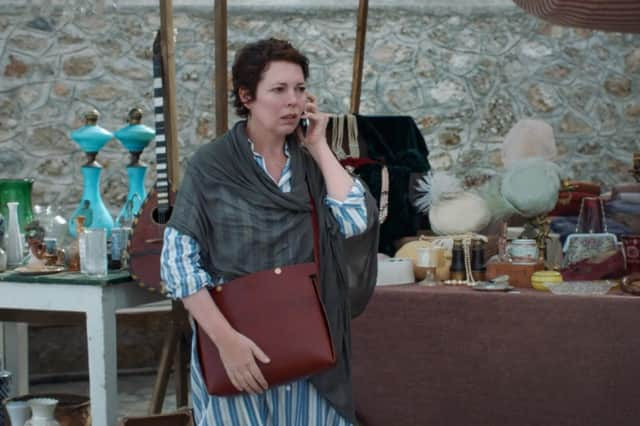Film reviews: The Lost Daughter | Swan Song


The Lost Daughter (15) 4stars
Swan Song (15) 4stars
For her feature debut as a writer/director, Maggie Gyllenhaal makes unsettling work of Elena Ferranti’s 2008 novel The Lost Daughter, about the complexities of motherhood and the pressure on women to yield to its demands.
Olivia Colman plays Leda, a British academic whose holiday on the Greek island of Spetses stirs up uncomfortable memories when she becomes embroiled in the lives of a gauche, mobbed-up Italian-American family holidaying in the same resort. Though she relishes her own company, she recognises something of herself in Nina (Dakota Johnson), the beautiful but stressed-out mother of a little girl who seems more like a prisoner than a parent. When the little girl goes missing one day, it’s Leda who helps finds her and while there’s much gratitude on the part of the family, Leda impulsively steals the kid’s favourite doll and hides it in her apartment, a simple act of cruelty that bonds her to Nina’s family in an emotionally disturbing way.
Advertisement
Hide AdGyllenhaal uses this to crank up the psychological tension as the fear of discovery starts having an odd effect on Leda, whose self-imposed exile seems to be an ongoing experiment in allowing herself the freedom and permission to reconnect with the impulsive person she used to be before having kids. Flashbacks to her earlier family life give us elliptical insights into how Leda has ended up where she has (Jesse Buckley plays her as a younger woman). But Gyllenhaal is careful not to use these as a join-the-dots explanation for the character, preferring to let Colman’s inscrutability hint at the complicated feelings parenthood can elicit in people for whom it might not come naturally.
Gyllenhaal takes a non-judgmental approach to this rarely explored subject, but frequently frames Colman in skin-crawling close-ups that make it difficult to watch but impossible to avert your eyes.
Moonlight stars Mahershala Ali and Naomie Harris re-unite for Swan Song, a nuanced sci-fi drama about a dying man (Ali) who secretly clones himself to spare his wife (Harris) and child the grief and uncertainty his death will bring.


Making good on the promise of his Oscar-winning short films, debut writer/director Benjamin Cleary transforms this provocative, Black Mirror-esque premise into an absorbing drama about the ethics of cloning that refuses to simply regurgitate the best bits from Blade Runner. Instead it roots its characters in a more recognisable reality, albeit one in which technology is literally able to take over their lives.
That’s what happens when Ali’s character, Cameron, reluctantly agrees to be a guinea pig for a tech start-up run by Glenn Close’s Dr Scott. She’s in the early stages of field-testing cloning technology that can replace the terminally ill without their family’s knowledge and, with Cameron’s worsening seizures hastening his imminent demise, he agrees to have himself cloned and his memories transferred to Cameron 2.0 before it’s too late.
Here, the film provides us with the obvious bonus of seeing the double Oscar-winner acting against himself and it’s a measure of how good Ali is that he can create two subtly distinct characters from one starting point without confusing the plot. It also helps that Cleary resists the urge to go down the thriller route; instead his script reckons with the emotional toll this process takes on both versions of Cameron while also carving out enough space for Harris’s character, Poppy, to silently question the morality of her husband dictating her and her son’s futures without giving them any say in the matter.
Advertisement
Hide AdThe Lost Daughter is on selected release from 17 December and streaming on Netflix from 31 December. Swan Song is on selected release and streaming on AppleTV+ from 17 December
A message from the Editor:
Thank you for reading this article. We're more reliant on your support than ever as the shift in consumer habits brought about by coronavirus impacts our advertisers.
If you haven't already, please consider supporting our trusted, fact-checked journalism by taking out a digital subscription at https://www.scotsman.com/subscriptions